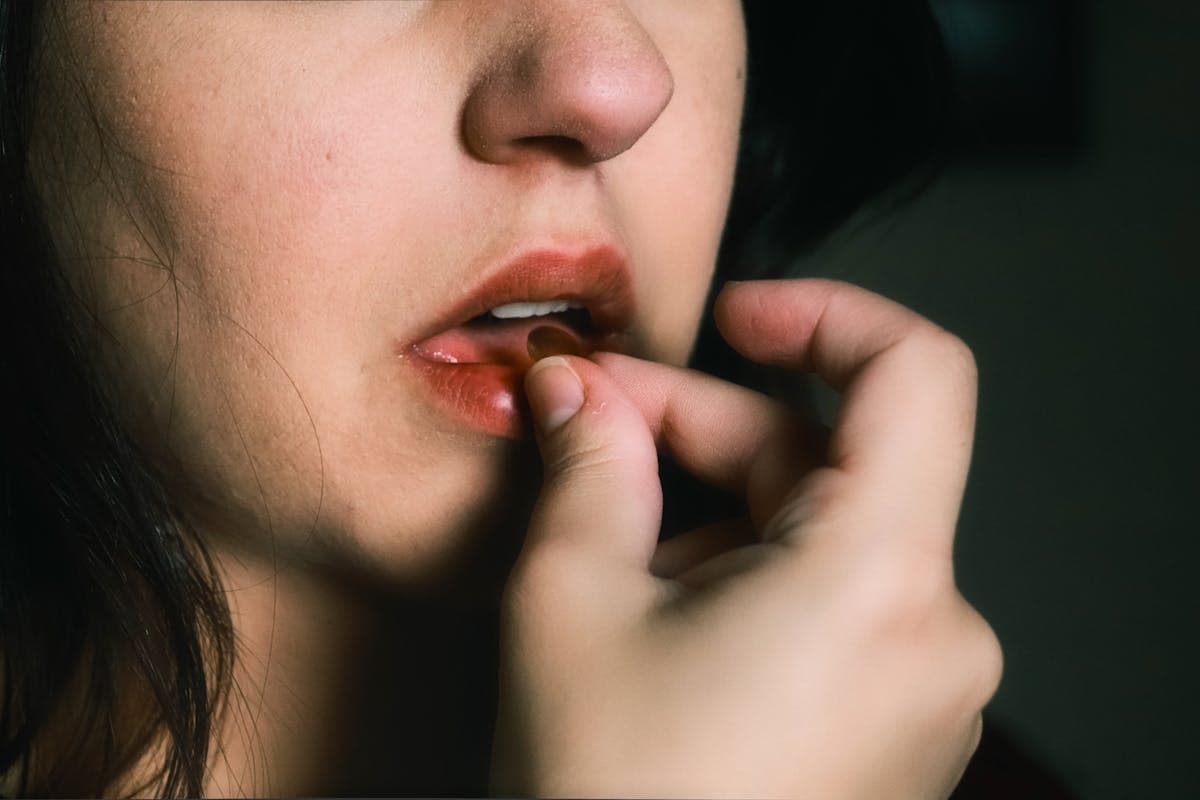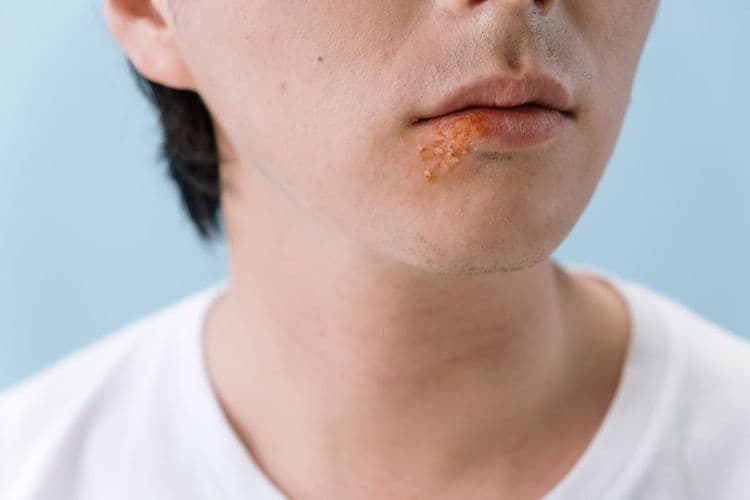Having a cold sore might seem an insignificant matter when considering a visit to the dentist, but this common viral infection could potentially complicate regular dental procedures. The risk of viral transmission and increased discomfort during treatment are issues worth pondering. How might this affect the safety and health of both patients and dental professionals? Should you reschedule your appointment or are there precautions that can be taken? These questions underscore the importance of understanding the interaction between dental health and cold sores.
Understanding Cold Sores
Although they may seem harmless, cold sores are a manifestation of the highly contagious Herpes Simplex Virus type 1 (HSV-1). They typically appear as fluid-filled blisters around the mouth or nose. Various factors can trigger an outbreak, including stress, fatigue, sunlight, and hormonal changes. It is essential to understand these cold sore triggers to manage and prevent outbreaks effectively. Once the virus is present in the body, it remains dormant most of the time. However, when activated, the virus causes painful sores that usually heal within one to two weeks. There are no cures for HSV-1, but antiviral treatments can help to reduce the frequency and severity of outbreaks, and alleviate the pain and discomfort associated with cold sores.
How Cold Sores Spread
While cold sores may appear to be a personal nuisance, understanding their contagious nature is essential. Cold sores, caused by the herpes simplex virus, are highly infectious. The primary method of cold sore transmission is through direct contact with an infected individual, usually through kissing or sharing personal items like toothbrushes or eating utensils. Herpes simplex can also spread when an individual touches a cold sore and then touches another part of their body without washing their hands. Moreover, the virus can be transmitted even when sores are not visible, as it exists in saliva and can be spread through coughing or sneezing. By understanding these transmission methods, individuals can take measures to prevent the spread of cold sores.
Impact of Cold Sores on Dental Health
Cold sores, also known as oral herpes, can indeed have an impact on dental health and procedures. It is important to understand how dental procedures can potentially trigger cold sore outbreaks and the measures that can be taken to prevent transmission during dental visits. The following discussion will address these concerns to provide readers with a thorough understanding of the implications of cold sores in the context of dental health.
Cold Sores: A Concern?
Are you aware of the potential impact cold sores can have on your dental health? Often triggered by stress, exposure to sunlight, hormonal changes or a weakened immune system, these painful, blistery sores can be more than just an aesthetic concern. In fact, they can greatly affect oral hygiene and dental health. This is because the open sores can become a pathway for bacteria to penetrate deeper into your oral cavity, potentially leading to other dental issues. Cold sore remedies often involve antiviral medications, which can help to reduce the duration and severity of an outbreak. However, maintaining good oral hygiene and regular dental check-ups are equally important in managing the impacts of cold sores on dental health.
Dental Procedures and Herpes
How does the presence of a cold sore impact dental procedures? Herpes simplex virus, the cause of cold sores, present a unique challenge in dental settings. While dental procedures do not typically exacerbate herpes, the physical trauma could potentially trigger an outbreak. In addition, the virus can be easily spread within a dental office if precautions are not taken. Dentist recommendations often include rescheduling non-emergency procedures until the cold sore has fully healed. For emergency procedures, herpes treatment may be necessary prior to the appointment to reduce the risk of transmission. Understanding the interplay between dental procedures and herpes is essential for both patient safety and the maintenance of overall oral health.
Prevention During Dental Visits
While it might seem inconsequential, the presence of a cold sore during a dental visit can greatly impact oral health. Cold sores, caused by the herpes simplex virus, are highly contagious and can spread to other areas of the mouth during dental procedures. Consequently, infection control is paramount. Dental professionals are well-versed in maintaining stringent oral hygiene standards to prevent cross-contamination. This includes the use of gloves, sterilized instruments, and disinfectant mouthwashes. However, patients can also contribute to infection control. If you have an active cold sore, reschedule your appointment or inform your dentist in advance. This allows necessary precautions to be taken, ensuring your oral health is not compromised.
Risks of Dental Procedures With Cold Sores
Even though cold sores might seem like a minor inconvenience, they can pose certain risks when it comes to dental procedures. The primary risk associated with dental treatment during an active cold sore outbreak is the potential for the virus to spread. This can occur through direct contact with dental instruments or the dentist’s hands, even when gloves are worn. Moreover, certain procedures, such as tooth extraction or root canal, can exacerbate the condition, leading to more severe outbreaks. Additionally, the physical trauma from dental work can potentially delay the healing process of existing sores. It’s essential to understand these risks to make an informed decision about scheduling dental procedures if you have a cold sore.

Dental Professionals’ Perspective on Cold Sores
To further understand the issue, it is critical to contemplate the perspective of dental professionals on cold sores. The question of whether cold sores are a significant concern in dental settings will be examined, followed by an exploration of the management strategies employed by these professionals. This insight will provide an extensive viewpoint on the matter, aiding patients in making informed decisions.
Cold Sores: Dental Concern?
How significant is the presence of a cold sore when it comes to dental appointments? Cold sores, also known as oral herpes, are regarded as a significant concern in the dental field due to their contagious nature. The virus causing these sores, Herpes Simplex, can easily be spread to other areas of the mouth during a dental procedure, potentially causing additional outbreaks. Moreover, cold sores can complicate dental hygiene practices, as they may bleed or become irritated during routine cleaning. Consequently, dental professionals often recommend rescheduling appointments if a cold sore is present, to protect both patient health and prevent further transmission of the virus. Fundamentally, the presence of a cold sore is a critical factor to take into account prior to a dental visit.
Cold Sore Management Strategies
Given the potential complications associated with treating patients with active cold sores, dental professionals have developed specific management strategies to deal with such situations. The primary aim is to minimize the risk of viral spread and facilitate faster recovery. Cold sore treatments generally involve the use of antiviral medications, which can considerably shorten the duration of the outbreak if used early. Topical creams or ointments can also provide relief from discomfort and potentially reduce the healing time. In addition, dental professionals may recommend rescheduling non-urgent procedures until the cold sore has fully healed. This approach not only protects the patient but also reduces the risk of transmission within the dental setting.
Precautions for Dental Visits With Cold Sores
While it may be challenging to manage a dental visit with a present cold sore, certain precautions can greatly reduce the risk of further complications. Symptom recognition is paramount. Patients should be aware of the stages of cold sores, which can range from tingling and itching to blisters and oozing. If a cold sore is in its blister or oozing stage, it is highly infectious, and dental work may exacerbate the situation. In addition, patients should explore treatment options beforehand. These may include antiviral medications to shorten the cold sore’s lifespan or numbing ointments for pain control. Patients should also notify their dentist of a present cold sore to discuss possible rescheduling or precautions to avoid spreading the virus within the dental office.
Managing Cold Sores Before Dental Appointments
Before a dental appointment, it is essential for patients to take proactive steps in managing their cold sores to prevent complications during the visit. Cold sore management involves initiating antiviral therapy at the first sign of an outbreak. Over-the-counter creams or prescription medications can help speed up the healing process and reduce the risk of transmission. Maintaining oral hygiene is also vital. Regular brushing and rinsing with an antiseptic mouthwash can help reduce viral shedding and infection spread. To minimize irritation and discomfort, patients can apply a protective gel or patch over the cold sore. It’s also recommended to avoid hot, spicy, or acidic foods that may worsen symptoms before a dental appointment. Remember, early and effective management is key.
When to Reschedule Your Dental Appointment
Despite the importance of regular dental visits, there may be instances when rescheduling your appointment is necessary, particularly when dealing with cold sores. The presence of cold sores, medically known as oral herpes, can increase the risk of cross-contamination and potential discomfort during dental procedures. In such cases, managing symptoms becomes essential. You should consider rescheduling appointments if your cold sores are at their peak or causing severe discomfort. In most instances, dental professionals prefer to wait until the sore has considerably healed. Rescheduling not only aids in symptom management but also prevents further spread of the virus. Always consult with your dentist about your condition before making decisions about your dental care.
Frequently Asked Questions
Can Cold Sores Lead to Other Oral Infections?
Yes, cold sores can potentially lead to other oral infections. Poor oral hygiene can exacerbate cold sore complications, making the mouth more susceptible to bacterial infections, thereby emphasizing the importance of maintaining good oral health.
Are There Any Home Remedies for Treating Cold Sores?
Yes, there are several natural treatments for cold sores such as applying lemon balm, lysine, or ice. Over-the-counter antiviral creams can also be utilized to speed up recovery and alleviate discomfort.
What Foods Should I Avoid When I Have a Cold Sore?
When experiencing a cold sore, it is advisable to avoid spicy and acidic foods. These can irritate the sore, prolong healing time, and increase discomfort. Opt instead for bland, soft foods until the sore heals.
Does Stress Trigger the Outbreak of Cold Sores?
Yes, stress can trigger cold sore outbreaks due to its negative impact on the immune response. Effective stress management techniques may potentially reduce the frequency of cold sore flare-ups by enhancing overall immune function.
How Long Does a Typical Cold Sore Outbreak Last?
A typical cold sore outbreak lasts between 7 to 10 days. The outbreak phases include the prodrome, blistering, ulceration, crusting, and healing stages. Each stage contributes to the total duration of the outbreak.


